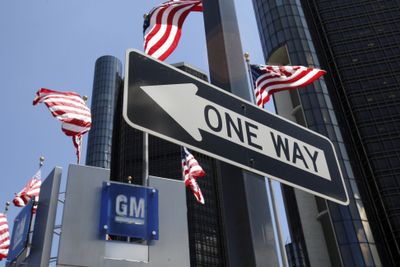Old GM shares carry no value

What do Monopoly money and old shares of General Motors have in common? Well, they’re worthless.
Don’t get caught up in the excitement of GM emerging from bankruptcy recently. The shares of the old GM literally have no claim on the assets or earnings of the newly reborn General Motors.
Consider these words from GM itself:
“GM management continues to remind investors of its strong belief that there will be no value for the common stockholders in the bankruptcy liquidation process, even under the most optimistic of scenarios. Stockholders of a company in Chapter 11 generally receive value only if all claims of the company’s secured and unsecured creditors are fully satisfied. In this case, GM management strongly believes all such claims will not be fully satisfied …”
The shares of the old GM you might own have no relation whatsoever to the GM that just emerged from bankruptcy. They are completely separate corporate entities.
Sadly, it seems many folks don’t understand this, as they’re still buying shares. It’s almost certain that someone buying these stubs today will end up losing their entire investment.
So sell your shares of the old GM, if you can. You’re not hurting America, GM or anyone else by selling. The new GM will be leaner and far more stable than its predecessor, but its shares won’t debut for quite some time.
Ask the Fool
Q: Do companies reduce their dividends? – L.N., Hartford, Conn.
A: They try hard not to, because it’s often seen as a sign of trouble, but sometimes companies have to reduce or eliminate dividends. In our current struggling economy, many companies have done so, including big names such as JPMorgan Chase, Bank of America, General Electric and Toyota.
Many companies (especially young ones) pay little or no dividend, preferring to reinvest most of their earnings to help themselves grow. For example, Dell, Cisco Systems and Amgen pay no dividend, while Oracle, Hewlett-Packard, MasterCard and CVS Caremark pay modest ones.
But strong dividend-paying stocks can turbocharge your portfolio. In “The Future for Investors” (Crown Business, $27.50), Jeremy Siegel reports that an investment in the 10 highest-yielding of the 100 largest S&P 500 stocks would have returned more than 15.7 percent annually from 1957 to 2003, turning a $10,000 investment into more than $8 million. Compare that with an annual gain of 11.2 percent for the overall S&P 500.
My dumbest investment
In the early 1980s, the stock of a teletape company I worked for had done well. The demand for video services had skyrocketed, as cable television spread and production for many new channels made life very good for people in the business. After I moved on to a new job, I inherited some money and invested $10,000 in my former employer’s stock. I sold it for $3,000 several years later. The problem was that I’d had no idea what I was doing, and I let sentimentality guide me. Having worked for the company for so long, I felt as though I had inside knowledge. I ought to have bet against it, realizing that its infrastructure was crumbling and that cash flow was an issue. I didn’t look at the present, but let my memory of past performance guide me. I know that intuition can sometimes lead us to high performers – but make your investments via reasoned, rational decisions. – Phillip Schloss, Hillsborough, N.C.
The Fool Responds: Amen. And remember that some businesses become obsolete. The digital age has caused pain for many industries, for example.